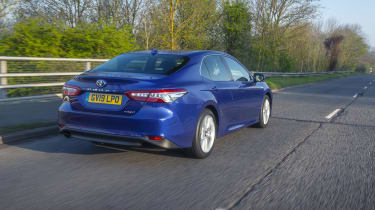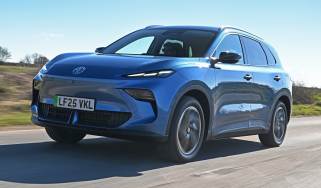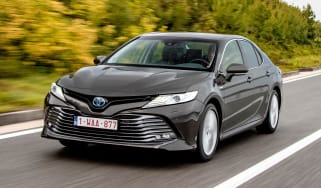Toyota Camry Hybrid review
The Toyota Camry Hybrid is a decent large saloon, but more efficient and interesting options are available for similar money
Pros
- Spacious interior
- Comfortable and quiet
- Good company-car costs
Cons
- Plug-ins will be cheaper to run
- Not very involving to drive
- Rather plain styling
| Car type | Fuel economy | CO2 emissions | 0-62mph |
|---|---|---|---|
| Hybrid | 50-53mpg | 120-125g/km | 8.3 seconds |
Before this car arrived in 2019, the Toyota Camry name hasn't been seen in Europe since the early 2000s. But with the departure of the mid-sized Avensis from the line-up, the company felt the time was right to bring the badge back to the UK. This time it’s equipped with a 2.5-litre petrol hybrid engine delivering 218bhp, getting from 0-62mph in 8.3 seconds en route to a top speed of 112mph.
Official fuel economy of 50mpg is by no means groundbreaking, while CO2 emissions of 120 to 125g/km aren’t low enough to trouble the class leaders, either. However, the Camry is capable of travelling short distances (no more than two miles) under electric power alone, which should make it very efficient in towns and cities. And it’s around town where the Camry makes the most sense: it’s extremely quiet at low speeds, especially in electric-only mode, while the electric motor itself is powerful enough to deliver decent acceleration and overall performance.
At higher speeds – such as on dual-carriageways and motorways – the Camry performs less well. Accelerate hard and the revs from the engine rise accordingly, although the noise is nowhere near as loud as older automatic hybrids from the past. In any case, the powertrain’s combined 218bhp means you rarely need to use full throttle. At a 70mph cruise, the Camry’s engine settles down and is suitably quiet, making it easier for you to listen to the noticeable flutter of wind noise over the car’s body.
Using the same platform the latest Toyota RAV4 and Toyota Corolla, the Camry delivers the “confident and natural handling” that Toyota’s engineers were aiming for. Rivals such as the Ford Mondeo Hybrid are still a little sharper to drive, but the Camry’s light steering is neat and grip from the tyres is plentiful. It’s comfortable, too, feeling smooth and relaxed without descending into the overly floaty or wallowy sensation that some softly sprung cars can suffer from.
On the face of it, a starting price of just over £32,000 looks a little steep, but a combination of reasonable running costs and a low Benefit-in-Kind company-car tax rating make the Camry’s pricing look pretty compelling next to diesel versions of the Skoda Superb and Volkswagen Passat. The plug-in hybrid versions of those cars make the Camry look expensive on company-car tax, though, which is no small matter since Toyota reckons 80% of the Camry’s sales are to fleet customers.
Among those business users will no doubt be private-hire drivers, whose passengers are unlikely to complain about the space in the rear: there’s enough room for six-foot adults to get comfortable, and all versions of the Camry get a leather interior as standard. At 524 litres, the boot has plenty of space for a pair of large suitcases, although the saloon-style opening means loading the Camry will be trickier than hatchback rivals like the Superb.
Unlike the Corolla, the company has no plans for a Touring Sports estate version of the Camry Hybrid. There are just two trims to choose from: Design and the top-spec Excel. Design cars have 17-inch alloy wheels and get LED lights, dual-zone climate control, heated front seats and keyless entry as standard. Sat nav and a reversing camera are included, too.
Stepping up to Excel introduces 18-inch alloy wheels – also increasing BiK – while adding LED foglights, wireless phone charging and a raft of advanced safety features such as rear cross-traffic alert and blind-spot monitoring. While such technology is commendable, the touchscreen infotainment isn’t: Toyota’s system is one of the worst out there, combining poor graphics with a confusing user interface that’s very hard to get the hang of.
Overall, however, the Camry is a well sorted, comfortable business saloon. But with several plug-in hybrid rivals around and various efficient and more practical hybrid alternatives in Toyota’s own line-up, you have to really want the executive styling and comfort to justify the Camry. For a more detailed look at the car, read on for the rest of our in-depth review...




